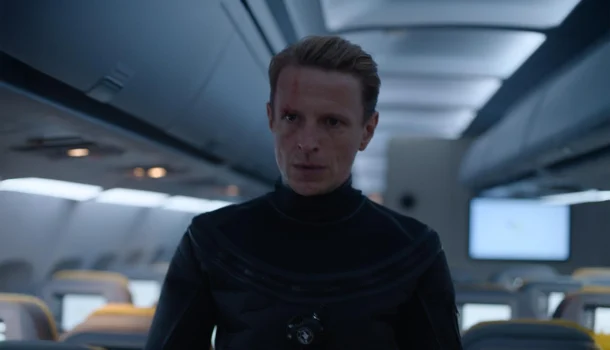If many contemporary productions seem to prefer the comfort of the predictable, “Blood Red Sky”, directed by Peter Thorwarth, chooses to brave the storm. Supported by undeniable audacity, the film rejects generic formulas, betting on an unlikely blend of supernatural horror and airborne survival drama. The mixture of inspirations — from the visceral rawness of “Hellraiser” to the documentary urgency of “United 93” — is not merely a collage of styles, but rather generates a tension that seems intent on tearing apart genre conventions, renewing the path Yeon Sang-ho boldly opened with “Train to Busan”.
The enigmatic relationship between a mother and her son is the hidden axis of the story. Nadja, portrayed with restrained intensity by Peri Baumeister, and Elias, played with remarkable subtlety by Carl Anton Koch, are thrust into the epicenter of chaos when their flight is hijacked by fundamentalist terrorists. What the hijackers fail to realize is that, concealed beneath Nadja’s fragile appearance, lies something infinitely more threatening than their weapons and doctrines. Rather than merely revolving around external danger, the narrative dives deep into the protagonist’s internal turmoil, setting the stage for a revelation that not only subverts expectations but reframes the entire understanding of the horror at play.
Thorwarth traces Nadja’s transformation with rare skill. Initially presented as a disciplined survivor who rigorously controls her condition with medication, she is forced by the brutality of the hijacking to abandon any human facade. The metamorphosis is both brutal and tragic: a tormented vampire, whose fierce will to protect her son outweighs her own repulsion toward the creature she has become. This profound moral conflict — sacrificing the remnants of her humanity to save what she loves — transcends horror to touch on a rare existential dilemma.
“Blood Red Sky” draws its vigor from embracing its own absurdity without apology. By unleashing her true nature, Nadja reinvents absurdist horror with invigorating energy, allowing the story to shed any strict realism and instead gain emotional intensity. Elias, with his sharp innocence, captures the essential truth: monsters and heroes are but unstable constructs. The chemistry between Baumeister and Koch transcends the screen, imbuing the scenes with a paradoxical warmth amidst the claustrophobic atmosphere and the latent hysteria gripping the aircraft.
The arrival of Farid, portrayed with quiet gravity by Kais Setti, introduces an unexpected dimension of solidarity. The alliance that forms among the trio is anchored in an intuitive recognition of the humanity still surviving beneath layers of horror. It is not just about staying alive, but about preserving fragments of dignity in a scenario determined to erase them. Notably, Thorwarth resists the temptation to deliver a political discourse about the terrorists; his approach is more astute: letting the brutality of events carry the implicit critique.
The visual parallel between Nadja and Pinhead from “Hellraiser” is as suggestive as it is unsettling. Both bear the mark of an existence caught between boundaries, embodying the loss of human identity in exchange for unspeakable power. However, unlike Barker’s nihilistic sadism, “Blood Red Sky” infuses its creature with regret and a longing for redemption. Nadja does not seek to reclaim an ordinary life — an obviously impossible task — but rather to assert a sense of responsibility that transcends her dark past.
The final separation between Nadja and Elias is less a rupture than a necessary transition. By being taken in by Farid, the boy not only finds a new family but also the possibility to forge a path free from the shadows of a grim destiny. This subtle gesture of continuity offers a poetic nod to the idea that even amidst the direst circumstances, life insists on reinventing itself.
In the closing sequence, Thorwarth introduces a post-apocalyptic undertone that reframes the entire previous experience. Without fanfare, the film suggests that violence is not confined to the microcosm of the airplane but is symptomatic of a broader collapse, a silent corruption of the world around us. “Blood Red Sky”, without ever proclaiming itself grandiose, ends its story with an unexpected breath of melancholy and resilience, silently challenging viewers to ponder: what kind of monsters are we willing to become in order to survive?
Film: Blood Red Sky
Director: Peter Thorwarth
Year: 2021
Genres: Thriller/Action
Rating: 8/10

